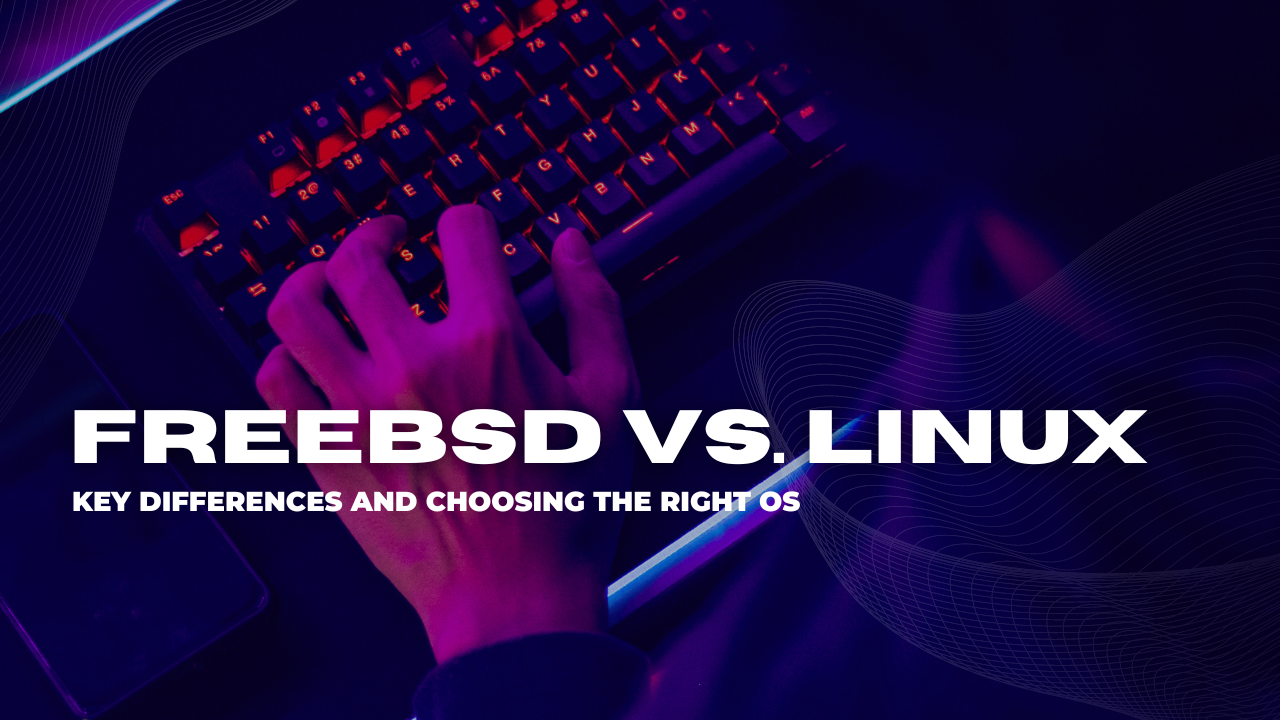FreeBSD vs. Linux: Key Differences and Choosing the Right OS

When it comes to selecting an operating system, understanding the nuances between FreeBSD and Linux can be crucial for making an informed decision. Both are powerful, open-source systems, but they cater to different needs and philosophies. Here, we delve into the key differences between FreeBSD and Linux, highlighting their unique strengths and considerations.
Licensing Models
FreeBSD:
- BSD License: FreeBSD operates under the BSD license, which provides significant freedom for using, modifying, and distributing the source code without the obligation to share modifications. This makes it an attractive option for proprietary development and commercial use (A-Team Systems, 2024; Serverspace, 2024).
Linux:
- GNU General Public License (GPL): Linux uses the GPL, which requires that any modifications and distribution of the source code be released under the same license. This fosters a collaborative and open development environment, ensuring that enhancements benefit the entire community (RedSwitches, 2024; Serverspace, 2024).
Hardware Support
Linux:
- Broad Compatibility: Linux supports a wide range of hardware, from desktops to servers to IoT devices, largely due to contributions from various hardware manufacturers. This broad support makes Linux versatile for different applications (UbuntuPit, 2024; Serverspace, 2024).
FreeBSD:
- Specialized Support: While FreeBSD is effective in supporting network cards and server hardware, it has limited support for newer graphics cards and some exotic devices. This can make it less versatile compared to Linux (UbuntuPit, 2024; Serverspace, 2024).
System Completeness
FreeBSD:
- Complete Operating System: FreeBSD is a complete OS, including a kernel, drivers, documentation, and utilities, all managed as a cohesive project. This integrated approach ensures consistency and stability across the system (Zenarmor, 2024; UbuntuPit, 2024).
Linux:
- Kernel-Based System: Linux itself is just a kernel and relies on third-party software to form a complete OS. Different distributions package the Linux kernel with various software components, resulting in a diverse ecosystem (Zenarmor, 2024; A-Team Systems, 2024).
Performance and Optimization
FreeBSD:
- Stability and Efficiency: Known for its stability and resource efficiency, FreeBSD excels in server environments and offers consistent performance, particularly for network and I/O operations (UbuntuPit, 2024; RedSwitches, 2024).
Linux:
- Scalability and Versatility: Linux is highly scalable and performs well in diverse scenarios, from desktops to servers. Its adaptability makes it suitable for a wide range of use cases (RedSwitches, 2024; Serverspace, 2024).
Security
FreeBSD:
- Security-First Approach: FreeBSD has a reputation for fewer security issues and includes robust, pre-configured security features. It also integrates a built-in Security Event Auditing system (Zenarmor, 2024; A-Team Systems, 2024).
Linux:
- Customizable Security: While Linux can be highly secure, its security largely depends on user configuration. Its flexibility allows users to implement extensive security measures tailored to their needs (A-Team Systems, 2024;
Community and Support
Linux:
- Large, Diverse Community: Linux benefits from a vast and diverse community, providing extensive support through forums, documentation, and online resources. This widespread use also means more frequent updates and faster development cycles (RedSwitches, 2024; UbuntuPit, 2024).
FreeBSD:
- Specialized Community: FreeBSD has a smaller but highly active and specialized community. While it may not have the same volume of resources as Linux, its focused community is very responsive and supportive (Serverspace, 2024; A-Team Systems, 2024).
Conclusion
Choosing between FreeBSD and Linux depends on your specific needs and technical requirements. FreeBSD offers a stable, integrated system ideal for server environments, while Linux provides broader hardware support and greater versatility. Understanding these key differences can help you select the right OS for your projects and goals.
References
- Zenarmor: FreeBSD vs Linux in 2024
- A-Team Systems: FreeBSD vs Linux: Which Open Source OS is Superior?
- Serverspace: FreeBSD vs Linux: What's the Difference? An OS Comparison Guide
- RedSwitches: Choosing Between FreeBSD Vs Linux: Which Is The Best OS?
- UbuntuPit: FreeBSD vs. Linux: 20 Things to Know About the Systems
Follow me on:
X: @maxiujun
Threads.net @xiujunma
BlueSky: @maxiujun.bsky.social
Read Next
User and Group Management in FreeBSD
User and group management is a fundamental aspect of system administration in FreeBSD. Properly managing users and groups helps ensure system security, organize permissions, and facilitate collaboration among users. This
FreeBSD Usage Statistics for 2024
FreeBSD, a robust and versatile Unix-like operating system, continues to be a significant player in specific niches of the IT industry. Known for its advanced networking capabilities, security features, and

